On October 20, 2016, the “Tsinghua Students Dialogue with Board Members” was in full swing as part of the series of activities of Tsinghua SEM 2016 Advisory Board Meeting. 14 Board members entered 14 Tsinghua SEM classrooms to interact with students in an intimate setting.
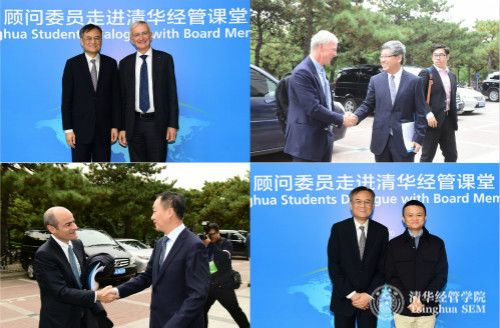
Advisory Board Members arrive at Tsinghua SEM
(from top left clockwise: Denis Duverne, Chairman of the Board, AXA Group, A. Michael Spence, Professor, Stern School of Business, New York University, 2001 Nobel Laureate in Economics, Carlos Brito, CEO, Anheuser-Busch InBev, Jack Ma, Executive Chairman, Alibaba Group)
The 14 Board members participating in the dialogue sessions were: Jim Breyer, Founder and CEO, Breyer Capital, Carlos Brito, CEO, Anheuser-Busch InBev, Denis Duverne, Chairman of the Board, AXA Group, Richard Li, Chairman and Chief Executive, Pacific Century Group, LI Rongrong, Former Chairman, State-Owned Assets Supervision and Administration Commission, Andrónico Luksic, Chairman, Luksic Group, Jack Ma, Executive Chairman, Alibaba Group, Doug McMillon, President and CEO, Wal-Mart Stores, Inc., David Schmittlein, John C Head Ⅲ Dean, MIT Sloan School of Management, Stephen A. Schwarzman, Chairman, CEO and Co-Founder, Blackstone, Risto K. Siilasmaa, Chairman, Nokia Corporation, Chairman and Founder, F-Secure Corporation, A. Michael Spence, Professor, Stern School of Business, New York University, 2001 Nobel Laureate in Economics, Ben van Beurden, CEO, Royal Dutch Shell PLC, Marjorie Yang, Chairman, Esquel Group.
Mr. Breyer shared with students in the classroom his thoughts about the massive fluctuations of the capital market in China and the large investment environment with drastic growth of Internet start-ups. According to him, this marks a prime time to invest in favorable start-up. Mr. Breyer is personally interested in the development of artificial intelligence, especially in cross-industry applications such as healthcare and finance. At the same time, he also focuses on investment into technology and software that can change our lives, addressing the social significance of projects. In conclusion, Mr. Breyer summarized his professional experience by encouraging students to travel as much as possible when they are still young and to learn and experience the diversity of cultures and environments in different societies. Only in this way, according to him, could we experience how big the world is and cultivate a humble attitude.
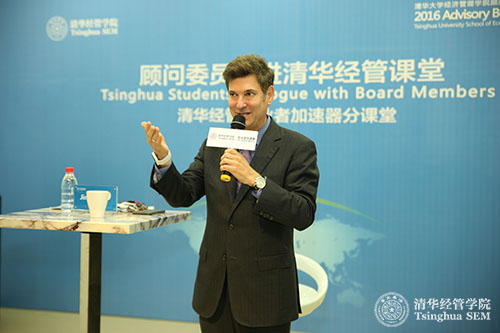
Jim Breyer, Founder and CEO, Breyer Capital
On “Bringing People Together for A Better World”, Mr. Brito talked about the culture and vision of Anheuser-Busch InBev (“AB InBev”) with Tsinghua SEM students. In particular, he elaborated the development of AB InBew and the 10 principles of the company on the aspects of vision, people and culture, including aspirations, ownership, cost control, fairness, etc. During the dialogue on “Global Merger and Acquisition Strategies of Enterprises,” he shared some valuable experiences with Chinese entrepreneurs: First, it is very important to conduct M&A for right reasons. There must be some strategic benefits other than just expanding size. Also, the acquirer should have a good execution team and leverage all the financial resources available. Then it is also critical to establish a single consolidated entity, especially in culture. Towards the end, Mr. Brito also conveyed his own perspective on the Chinese brew market.
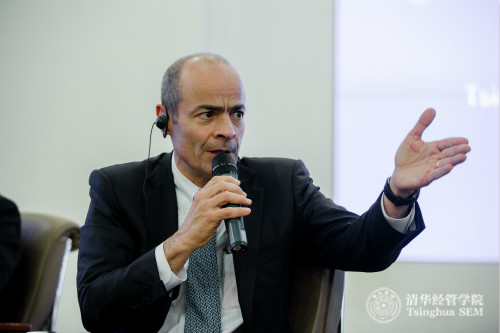
Carlos Brito, CEO, Anheuser-Busch InBev
Mr. Duverne gave a splendid speech about how insurance contributes to economic development. He began with introducing the broader values of insurance in the economy, finance industry and society, which was followed by several detailed facts on how insurance makes a difference in speeding up innovation, bearing risk, encouraging investment to facilitate economic growth, stabilizing economic cycles and financial cycles as well as financing economic development, especially infrastructure construction, through the use of insurance premium. Mr. Duverne then elaborated on the possible challenges the insurance industry could face in the future, in particular, the changes and challenges to be brought about by scientific and technological development and the emerging Internet and big data technologies. Mr. Duverne concluded his speech by mentioning that a without insurance would be vastly different, and insurance will continue playing an essential role in economic development. Along with the development of science and technology, the tools, products and methods of insurance will also undergo significant changes. Insurance technology will also bring about very attractive development opportunities for business as well as science and technology.
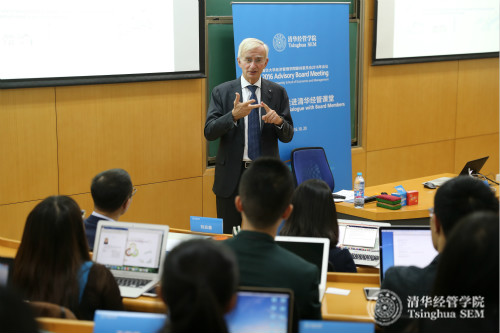
Denis Duverne, Chairman of the Board, AXA Group
Mr. Richard Li shared his experience and thoughts about the capital market and entrepreneurship with young entrepreneurs from the YES (Young Elite Sharing) Program for executive education. When brought up, he opines that the capital market is one of the most important topics each and every enterprise would face in the course of its development. Today’s debt capital market marks a record low with excessive capital, and it is hard to say whether it would shrink in the future. When it comes to business start-ups, Mr. Li said: “Changing the culture in a long-established enterprise is much harder than changing the operating model.” In addition, Mr. Richard Li also elaborated his views on topics such as the trend in the Chinese real estate market, operation strategy in the capital market, corporate governance in diversified group, etc.
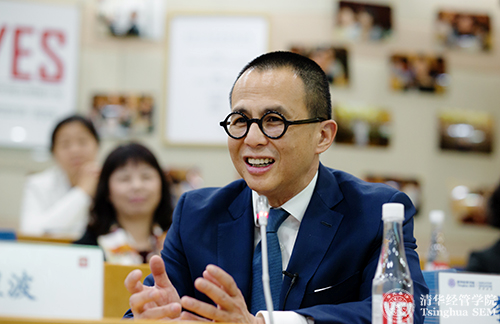
Richard Li, Chairman and Chief Executive, Pacific Century Group
Director Rongrong Li shared with students his own management philosophies and methodologies by summarizing his life-long experience in management as “Take the initiative, learn widely from others, merge and refine, and develop your own style”. To be specific, according to him, you have to make sure everything “work for me”; then be adept in learning widely from others, merge and refine such experiences, and eventually “read and make the book thinner”; finally, “develop your own style”, shaping your own unique management approach. A manager is supposed to be good at inspiring the collective enthusiasm of, not only his or her subordinates, but also the supervisors, thereby proactively soliciting support from the leadership. He pointed out that the fundamental objective of management is to enhance the efficiency for the allocation of resources. According to him, a manager is supposed to, first of all, inspire the enthusiasm, then bear both responsibility and blame, and, finally, have the spirit of perseverance. Speaking of the obstacles he faced when driving the reform of state-owned enterprises, he mentioned: “Accomplishing something is paramount. On this basis, anything else could be lived with. The entrepreneurial spirit means enduring humiliation and bearing perseverance per se.” In addition, Director Li also shared his insightful thoughts about the reform of state-owned enterprises, development of market economy and other relevant issues. As he indicated, economic methods are much more preferred through development of a market economy, whereas administrative methods must be used with caution. As for the reform of state-owned enterprises, he advocated a system and mechanism with responsibility as the core by mentioning that “An enterprise won’t succeed until responsibilities are properly allocated and in place. The management should clearly define and fulfill their respective responsibilities”.
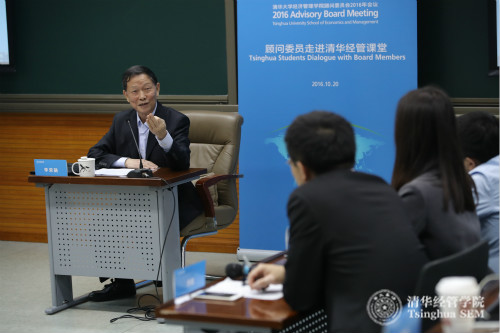
LI Rongrong, Former Chairman, State-Owned Assets Supervision and Administration Commission
Mr. Luksic shared with students his perspective of future development of the China-Latin America relationship under the theme “Trade Perspective between South America and China” as well as his own life experience. Starting from his first travel to China for investment with his father and the subsequent experience as a member at the advisory committee under Tsinghua SEM, Mr. Luksic talked about the friendly relationship for decades between China and Latin America. He spoke highly of the leadership China is now gradually taking in the world economy. Speaking of the future, Mr. Luksic predicted that, in the next 3 to 5 years, quite a few Chinese enterprises would be investing in Latin America, and the trade between China and Latin America would evolve from a couple of major products such as copper and red wine into deeper commercial exchanges. Finally, he shared his own life experience with the students and used his mountain-climbing experience to encourage the youth to believe themselves when faced with challenges, and to be courageous to reach out to the world with their knowledge, because success is in their hearts and “If you are convinced that you can do it, you can make it”.
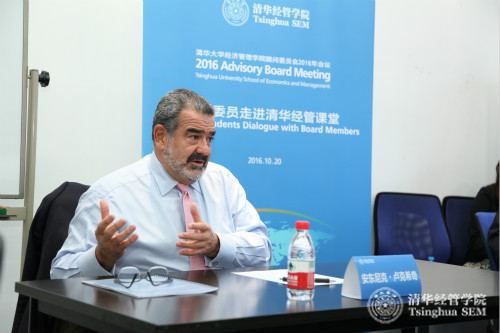
Andrónico Luksic, Chairman, Luksic Group
Mr. Jack Ma began by talking about his career as a teacher for six years. He mentioned that the teaching career had a significant impact on him, and he has always hoped that each and every of his staff would eventually surpass him. He also enjoyed sharing experiences. According to him, an entrepreneur must communicate with others as much as possible, so as to learn from and interact with others in this process. To him, success relies on emotional quotient, whereas staying undefeated requires intelligence quotient. Mr. Ma then mentioned the so-called “cultural self-confidence” that has drawn much attention recently. He held that, to be culturally self-confident, one has to have a prerequisite which is the understanding and respect of other cultures. “You are not qualified to judge a culture without even understanding it.” With regards to the future, Mr. Ma expressed that in the next thirty years, data would replace petroleum and become a truly most powerful energy, thereby everything, including college education, would undergo fundamental change. Finally, Mr. Ma shared his own view about the “entrepreneurial spirit” by indicating that the horizon of an enterprise determines the enterprise’s future. An entrepreneur must be persistent and indomitable, mentally strong; he or she must have a sense of mission, and must share with the society when identifying any social issues. It is also the kind of undertaking and courage that would never be shaken by gossips which makes up the entrepreneurial spirit. Before the classroom session, Jack Ma also made some exchanges and interactions with teachers and students at Tsinghua x-lab.
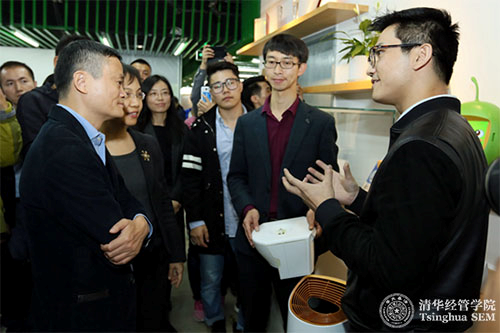
Jack Ma, Executive Chairman, Alibaba Group, talks with Tsinghua x-lab students
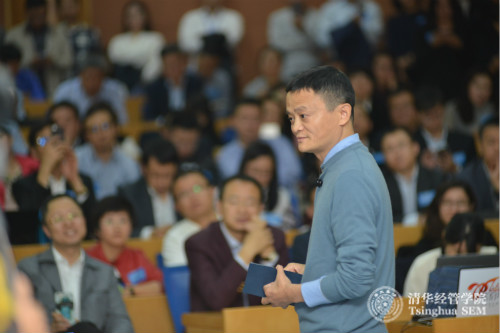
Jack Ma, Executive Chairman, Alibaba Group
Mr. Doug McMillon’s topic was “Wal-Mart’s Growth and the Future of E-Commerce, Personal and Career Development” for the classroom. He shared with Tsinghua SEM students the experience and development of the Wal-Mart Group in terms of retail, supply chain innovation, access to the Chinese market, etc. According to him, Wal-Mart’s way out is to guide the changes in time and in science and technology. In addition, a culture of diligence, excellence and that ‘Action speaks louder than words’ are also essential working and professional standards. Talking about future development, he held that the trend for Wal-Mart would be a conglomeration of e-commerce and traditional retailers.
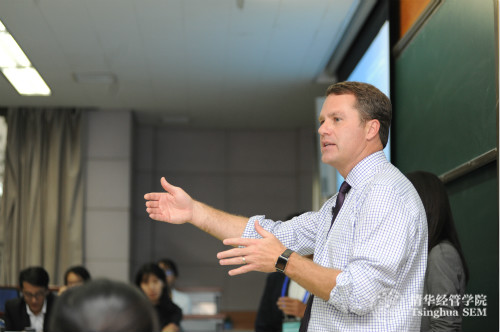
Doug McMillon, President and CEO, Wal-Mart Stores, Inc.
Mr. Schmittlein had a two-hour face-to-face discussion with students from the Tsinghua-MIT Global MBA Program, focusing on topics like leadership and management, globalization strategy, financial crisis, culture of the Sloan School, etc. With regard to the questions about “leadership” as raised by the students, Mr. Schmittlein considers that lots of leadership-related education focuses on the cultivation of skills, but skills are quite different from traits. However, to cultivate the traits of a leader, one has to have sufficient opportunities for independent choice, in order to choose his or her own life experience and then grow from that experience. As for the issue of globalization, he took for example the globalization of brands such as Alibaba, Huawei, Lenovo, Haier, etc., concluding that “Go Global” and “Create a Global Brand” are totally different approaches. In the process of globalization, a brand often needs customization based on local conditions. Some global brands take technology as their core competitiveness, some advance based on customer base, whereas some others would be highly recognized due to their brand culture. At last, he elaborated the four essential aspects of MIT Sloan’s core culture – Intelligent, Creative, Steady, Open.
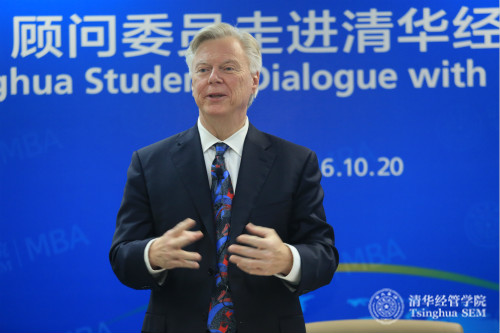
David Schmittlein, John C Head Ⅲ Dean, MIT Sloan School of Management
Mr. Steve Schwarzman shared his experience on “How to Build an Innovative and Inclusive Organization”. Taking his experience in founding the Blackstone Group, Mr. Schwarzman elaborated how he, as a leader, built the corporate vision and culture and ensured efficiency and cohesiveness of the organization. He addressed the importance of decision-making for establishing a sound organization, because success or failure for a business often depended on a decision. Regarding the students’ question on “how to become successful investor coming from other sectors”, Mr. Schwarzman said: “Investment is not intrinsic in your gene, but a learned skill that you have to master gradually through guidance from a good instructor.”
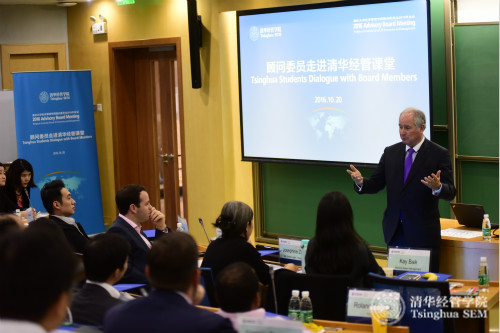
Stephen A. Schwarzman, Chairman, CEO and Co-Founder, Blackstone
Mr. Risto Siilasmaa shared his thoughts about the rapid changes in business model, enterprise management and traits of good leadership. Mr. Siilasmaa thinks that, when facing business transformation, “a visionary person addresses potential laws hidden behind more than benefit maximization.” Given the exponential rate of development, the scale and development mode of enterprises are posing challenges to traditional companies, so an entrepreneur should stay vigilant and optimistic so as to keep pace with the times. Finally, he mentioned six traits of an outstanding leader. To the students present, he recommended everyone to reflect thoroughly what kind of person he or she wants to be and then work to this end, to avoid losing their way in life.
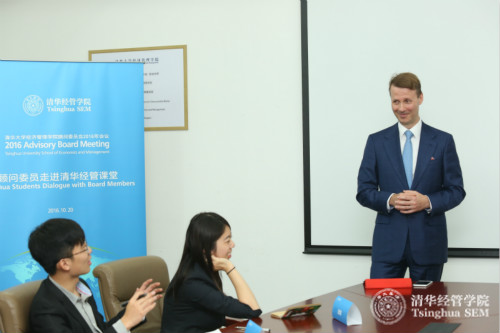
Risto K. Siilasmaa, Chairman, Nokia Corporation, Chairman and Founder, F-Secure Corporation
Professor Spencer gave a speech on economic globalization, Sino-U.S. relationship and income inequality. First, Professor Spencer briefly introduced the current world economy. Proceeding to the Sino-U.S. relationship, he expressed that the relations seem relatively solid for now because the two sides have so many shared interests. After that, he mentioned the impact of technological progress on income inequality. He concluded the speech by indicating that Sino-U.S. relationship is the weather vane of the world economy, and China and the United States would definitely work together due to the shared interests, but conflicts would be hard to avoid. After the classroom dialogue, Professor Spencer also had an afternoon tea session with a team of young faculty from Tsinghua SEM.
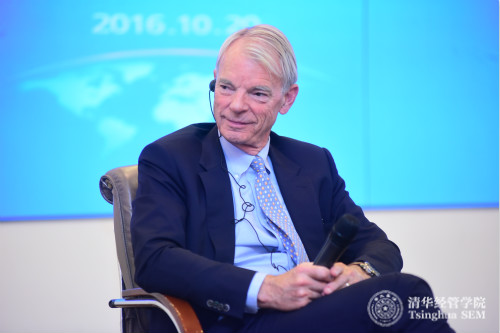
A. Michael Spence, Professor, Stern School of Business, New York University, 2001 Nobel Laureate in Economics
Mr. Ben van Beurden made a speech on topics such as prospect and innovation of the energy industry, Shell’s development in China and the leadership spirit. First of all, Mr. van Beurden introduced three significant aspects of energy industry development in the future -, greater market fluctuations;, new competitions;, and most critically, the transition to a large scale low-carbon energy system. Afterwards, Mr. van Beurden shared his views on leadership by addressing the importance of never giving up. Finally, he had friendly interactions with the students.
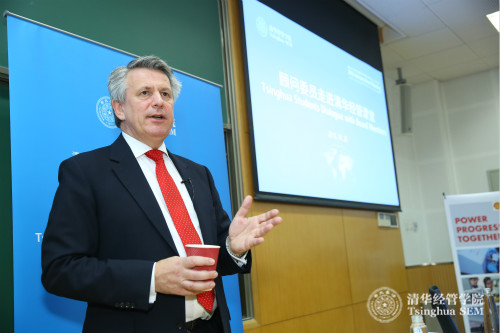
Ben van Beurden, CEO, Royal Dutch Shell PLC
Ms. Marjorie Yang made a keynote speech under the theme “Would Innovation Result in Unemployment or Bring about Happiness” at Tsinghua x-lab. According to Ms. Yang, there are two major problems in today’s society, one being the climate change and pollution, the other being the problem of the widening wealth gap. She took her own company, Esquel Group, as an example and explained the role of innovation in solving the above two major problems in a seemingly traditional industry. Citing a number of innovations by Esquel Group in textile material, dyeing process, waste disposal, etc., she addressed the importance of innovation for driving national economic development and business growth. Meanwhile, she pointed out that better divisional management could be achieved through managerial innovation in a company. After the speech, Mr. Yang further interacted with the audience and conducted a Q&A session.
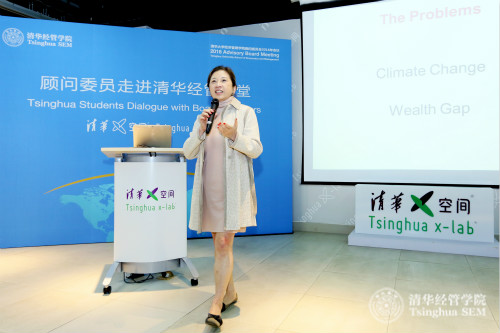
Marjorie Yang, Chairman, Esquel Group
The 2016 Tsinghua Students Dialogue with Board Members has come to encompass students from a larger variety of backgrounds. Apart from Tsinghua SEM’s undergraduates, doctoral, Master’s, MBA, EMBA and Executive Education students, students from Tsinghua’s other schools and departments, including those from the Tsinghua SEM’s undergraduate duel-degree programs, students of Tsinghua x-lab and entrepreneurs of Tsinghua SEM X-elerator also participated in the Dialogues.
 Latest News
Latest News